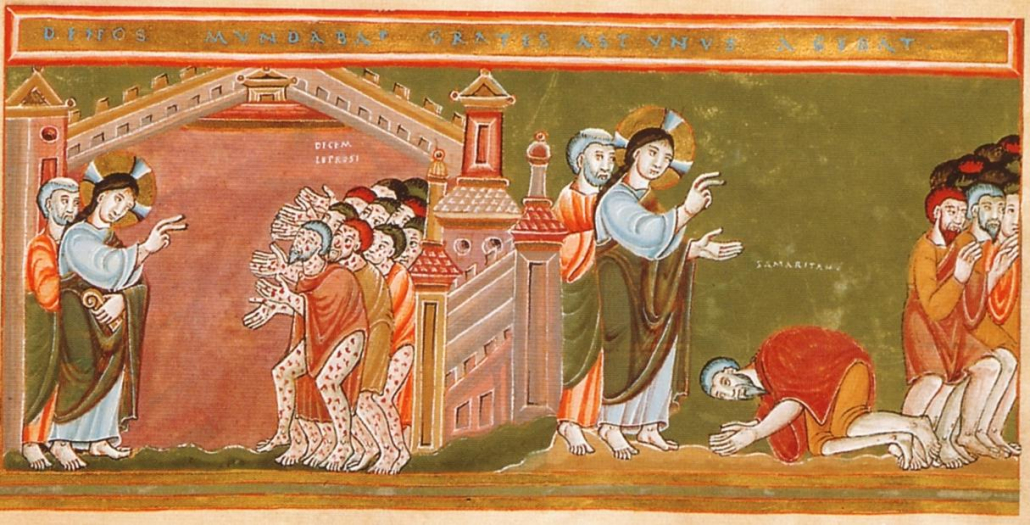Image: CodexAureus ‘Cleansing of the ten lepers’, c. 1035-1040.
‘Stigmata’
Andrew Collis
Ordinary Sunday 28, Year C
Psalm 66:1-12; Luke 17:11-19
The action takes place in a liminal space, in a nameless village somewhere between Galilee and Samaria. Jesus leads disciples to anticipate surprises, healing, new life at the margins, in various border settings.
We might consider liminal spaces including adolescence, middle age, older age; fledgling relationships, vocations; uncertain health; the space between the sacred and secular, the congregation and wider community; cross-cultural relations, interfaith dialogue; interspecies kinships and affinities; the transition from one gender/sex to another …
Our border setting experiences can be painful and confusing. They can mark us out as odd, frightening. They will leave their marks/stigmata.
The ten people with leprosy cry out for compassion. When Jesus sees them he responds.
A mark of difference, of rejection, may also signify holiness. The stigma both stings and stimulates. St Francis kissed the leper. And came to bear the stigmata of the Christ he loved.
We might reflect on feeling comfortable and uncomfortable in our own skins … imagine a leper losing touch with others, losing the sense of touch … acknowledge the ambiguities of touch, the preciousness of genuine intimacy … a safe/charged space between one person and another …
There are two Greek words in the text – iaomai rendered “cleansed/healed” and sozo “saved/made whole”. Ten were cleansed, one was saved. Ten were healed, one was made whole.
We might ponder this borderline, the space between iaomai and sozo, “healed” and “made whole”.
What’s the difference? Nine were relieved, one was deeply grateful. One was thankful, seeking out the source of new hope and life. One gave thanks – another Greek word: Eucharist.
One gives thanks, one praises God “in a loud voice”, one breaks into song …
The Spirit who saves, the Spirit who makes whole, incorporates. We are gathered, spirit and body, as one body. We belong. We join with one another on the way – in the way of compassion, in the way of empathy for the stigmatised. Solidarity.
And yet, difference matters. Jesus says, “Stand up and go your way; your faith has saved you.” The one who gives thanks and breaks into song partakes of risen life in a singular sense.
May our respect for difference be a remarkable trait. May we sing the Eucharist and may we break into song. May we fall down in praise, vulnerable like Jesus, Francis and the leper (rejected and marked), open to a healing encounter with our God.
And may we not seek to circumscribe places of healing but recognise (in liminal space, in the way of compassion) many stigmata of exclusion and election, suffering and hope. Amen.




